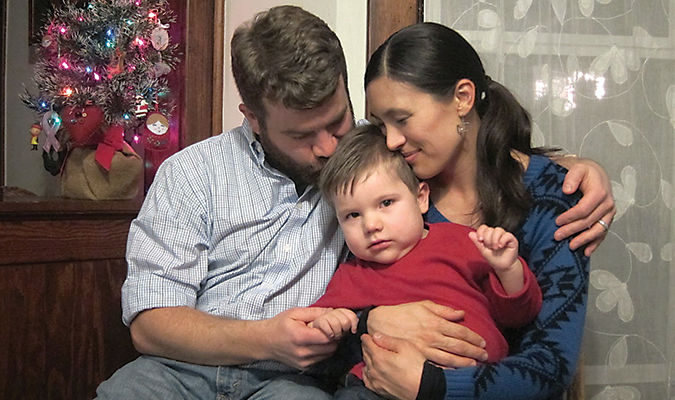Family moving in search of medical marijuana
Baldwin City native Ryan Reed lived in New York City when he and his wife, Salina native Kathy Reed, got engaged. They moved back to Lawrence to be close to their families. But now, they have to leave again.
In May, they will be moving to Colorado to seek medical marijuana treatment for their 2-year-old son’s regular seizures.
INTERACTIVE PROJECT
RELATED STORY
Marijuana debate ignites local viewpoints
“We need to speak up before we leave to let legislators know what we are doing and that we think it’s not right that our state isn’t allowing it for the sickest people, children, among us,” Ryan said. “We don’t have time to wait for the laws to change.”
“Nothing has panned out”
At nine weeks old, Otis Reed was diagnosed with intractable epilepsy, a disease resistant to any form of treatment. He has been through a hefty list of treatments, including all three of what the doctors call “the big guns” that are normally used to treat infantile spasms. The list of outcomes listed in his treatments package from the hospital says “no change in seizure activity” and “enlarged heart and high blood pressure.”
“We’ve tried everything and nothing has panned out,” Ryan said. “Some of the drugs have made his seizures worse. The side effects from these medications that he has been on, some of them have been horrible.”
For a while, Otis’s parents were told by their neurologist to record how many times Otis would have a seizure in a day. Ryan assumes a safe bet would be 100 seizures in a day for Otis, which in his case, consists of a quick jerk lasting only a second or two. What might look like only a “funny kid move” to some has actually stunted Otis’s development due to his constant erratic brain activity.
Otis can’t walk, can’t talk and is slowly falling behind other kids his age.
“The worst day I stopped counting at 600,” Ryan said. “When he’s having a cluster of seizures, he fights through them. He tries to go back to what he was doing before the fits. As a parent, it’s awesome to see him struggle through it and fight back.”
For two years he has been working on the “big third gun” that includes a high-fat diet, for which his parents have to weigh everything in grams before feeding it to Otis. But the diet weakened his bones to the point of breaking. When Ryan repositioned his immobile son in bed, Otis’s leg broke. This is what Ryan calls “a pretty low point” in his family’s struggle.
“I felt pretty guilty for that,” Ryan said. “But we’re glad that that’s over. It was a rough time for us.”
A new home for new hope
The idea for medical marijuana use finally came up in conversation when the Reeds realized they had gone through every legal option for their son, short of brain surgery. Doctors tell the Reeds that the marijuana procedure has a 50 percent chance of working, with possible positive results, ranging from one less seizure a day to complete freedom.
“If someone had told me when we started the process that I could either give my son heavy doses of steroids that caused ventricle hypertrophy or medical marijuana, I would have (chosen) medical marijuana,” Ryan said. “But six months ago, I would have thought medical marijuana was a joke.”
The couple has done extensive research on the effects of medical marijuana on children and is currently looking into a strain of the drug called “Charlotte’s Web.” Named after Charlotte Figi, a child who had symptoms somewhat similar to Otis’s that were cured by this drug, this strain of marijuana is low in the psychoactive compound in marijuana. But it is high in cannabidiol, or CBD, which has medicinal properties.
They have joined medical marijuana support groups to talk about the disease that won’t get better on its own. When testimonies say the only side effects are “less seizures” or “smiling more,” the drug seems like a viable option for the couple.
“We’ve separated the idea of hope and expectations,” Ryan said. “We hope this will help him get a better quality of life, but do we expect it to be Otis’s miracle that will heal him? No. But we are just doing whatever we can to give him the best life possible.”
Although many community members have shown the Reed family support, some still have reservations. The lack of research on the medicinal uses of marijuana makes the couple a bit hesitant. While he doesn’t have a desire to fight the legalization of the recreational use of marijuana, Ryan said that the stigma surrounding its medicinal qualities needs to change in order to save lives.
“We need to be able to do the research to prove that it’s not just anecdotal stories,” Ryan said. “It’s not just Charlotte, it’s not just the kids in Colorado, it’s science.”
Turning plan into action
But before the two decided to move, they brought their case to the Kansas legislature. They talked to a dozen different members of the House and Senate but eventually became exhausted from the ordeal and lack of response.
“I think that most of them, if put in the same shoes, would make the same decision for their kids or grandkids,” Ryan said. “But I don’t think that was enough to put it into action for those people.”
One person who took interest in the case was Representative John Wilson. Wilson attends the same church as the Reeds and had talked to his pastor about the case before it was even brought to his desk. So when Ryan presented his situation, Wilson told him he would do whatever he could to help.
“If people want to move to Colorado, they should move to hike or ski, not for medical care,” Wilson said. “That’s why I want to help them so that families like theirs don’t have to leave the state because we didn’t give them any other option.”
But Wilson shares Ryan’s dismal look on legalization, which he says “isn’t just an issue about hippies with black light posters anymore.” Wilson believes that the change has to come from both testimonies and scientific research, both of which are hard to get without legalization.
With an election in the fall, Wilson believes that new options could come up for families like the Reeds.
“It’s going to take credible science, thoughtful success stories from families and organization to work the system,” Wilson said. “That’s my part in this – teaching the Reeds how to work the system.”
Wilson said that because the majority party determines what bills will be brought to the table, it will take a speaker of the house willing to have an open conversation regarding the legalization of the drug. But with support from the house speaker, he believes all that would need to happen after that is a little bit of organization.
“People are seeing real benefits from medical marijuana use, but I think people need to be brought up to speed on what we are really talking about here,” Wilson said.
So while the Reeds are disappointed to leave their family and friends, they hope this adventure changes their lives drastically.
“I love Kansas, but we aren’t the most progressive state,” Ryan said. “If the federal government would take it off as a criminal drug, states could stop hiding behind that, and we could make some changes. I think that for Kansas it will be a while, but stories like this won’t go away. I think it’s happening, but not fast enough for us.”
To keep up with the Reed’s adventure, check out their blogs, here and here.



 THE UNITED STATES OF MARIJUANA – A special interactive project provides a state-by-state breakdown of marijuana laws as well as a quiz and local viewpoints.
THE UNITED STATES OF MARIJUANA – A special interactive project provides a state-by-state breakdown of marijuana laws as well as a quiz and local viewpoints.



